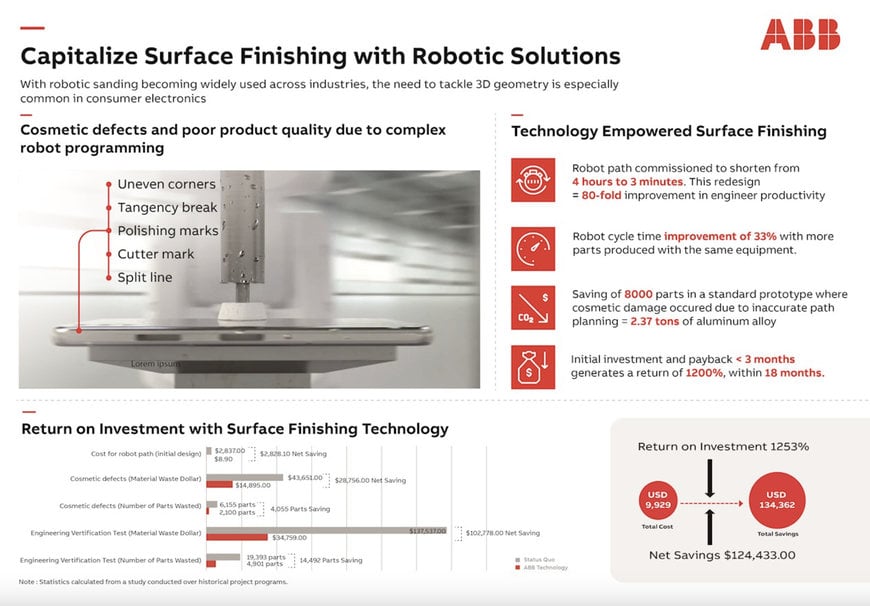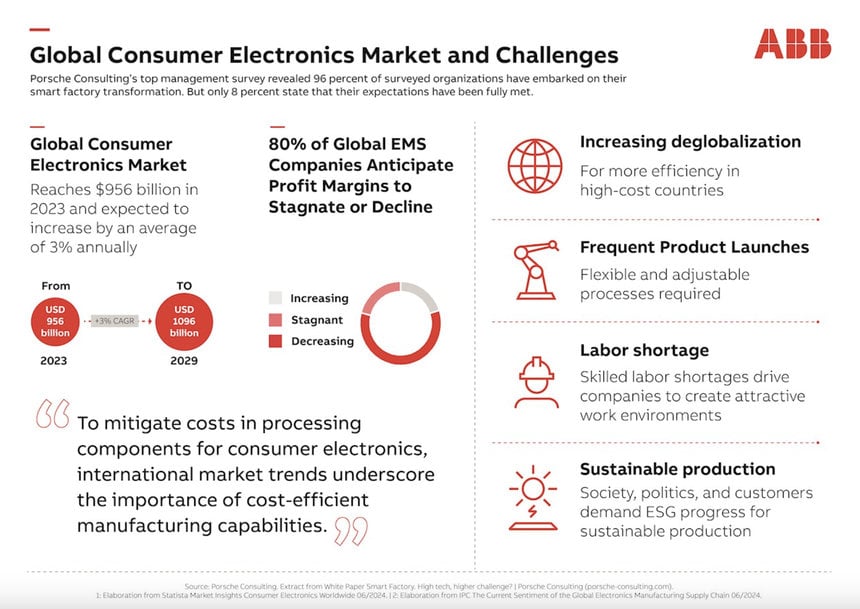electronics-journal.com
09
'24
Written on Modified on
ABB STUDY REVEALS ROBOTIC MACHINING BOOSTS ELECTRONICS MANUFACTURING PRODUCTIVITY BY 33%, OFFERS 1200% ROI
ABB Robotics and Porsche Consulting white paper highlights how automation technologies can deliver critical productivity, flexibility and sustainability benefits for electronics manufacturing.
global.abb

A new white paper co-authored by ABB and Porsche Consulting details how robotic automation in surface treatment applications can transform productivity and profitability in the electronics manufacturing industry. Titled “Capitalize surface finishing with technology empowered robotic solutions”, the paper encourages manufacturers to embrace the latest advances in robotic machining to increase production output and sustainability through reduced waste while cutting costs.
"Fierce market competition and low profit margins are among the most critical challenges facing consumer electronics manufacturers today. With rapid advances in product design and growing consumer demand, manufacturers are under pressure to minimize production cost while increasing output. By leveraging advanced robotics software and digital technologies, electronics manufacturing service (EMS) companies can potentially transform their productivity by 33 percent or more, while enhancing their sustainability by minimizing waste," says Craig McDonnell, Managing Director Business Line Industries, ABB Robotics.
A separate cross-industry survey of 48 top level electronics industry managers, including CEOs and COOs, by Porsche Consulting reveals productivity, reliability, flexibility, sustainability and attractiveness to employees as five key objectives underlying companies’ efforts to optimize their production networks. The results indicate that while 96 percent of companies have embarked on smart factory transformation to achieve these objectives, only eight percent of surveyed organizations have fully realized their expectations. This is due to a limited view that focuses on the automation of physical processes.
"Global Electronics Manufacturing Services (EMS) companies are facing various challenges, from supply chain disruption and a shortage of skilled labor to the need for more agile processes and pressure to demonstrate greater circularity in their operations. Digitalization and automation – including the use of robotic technologies – are not only crucial avenues for enhancing productivity, reliability, flexibility and sustainability, but they are also key drivers in the development of smart factories," says Juntian Dong, Partner, Head of Industrial Goods, Porsche Consulting China.
The paper highlights the use of robotic sanding and polishing in modern electronics manufacturing, where it is used to maximize the cosmetic appearance of consumer products such as smartphones. It explains how the efficiency of robotic finishing is often compromised by hard-to-use offline programming tools and problems. Deviations can also occur when virtual robot code is transferred to physical code, causing defects that require time-consuming manual fine-tuning to rectify, especially for 3D geometries. From an operational and commercial perspective, these challenges result in higher engineering costs for electronics manufacturers, together with greater reliance on expert resources, reduced product yields and increased waste.
The paper explains how these obstacles are addressed by ABB Machining PowerPac, part of ABB’s market-leading RobotStudio offline programming tool suite. Machining PowerPac allows automatic generation of CAD path code, achieving accurate representations of actual part surfaces and skipping the time-consuming traditional point-by-point commissioning process.

The white paper uses the findings of a study of historical project programs to demonstrate the improvements that Machining PowerPac can deliver. These include dramatic reductions in the time needed to generate a robot path – from four hours to three minutes – and improvements in robot cycle time of up to 33 percent, enabling more parts to be produced with the same equipment.
Other highlights include potential savings of 8,000 prototype parts due to reduced cosmetic damage from path design flaws, equivalent to 2.37 tons of aluminium alloy. These improvements in time, quality and productivity, together with additional savings in materials and energy, typically enabled investments in Machining PowerPac to be recouped within three months, with a projected ROI over 18 months of more than 1200%.
The whitepaper is available for free download here.
Find out more on surface finishing.
new.abb.com

